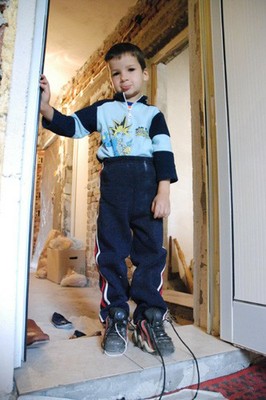SOS Children: Family Strengthening and Street Children in Europe
SOS Children has been working in Europe since the charity was established in Imst in 1949. Today SOS Children works across Europe, including 20 countries in Eastern Europe. Alongside our villages, SOS Children runs Family Strengthening Programmes that help care for vulnerable children in the wider community. Since 1970, SOS Children has developed projects and programmes in 20 countries from Albania to Ukraine supporting nearly 60,000 vulnerable children and their families in the local communities.
Here is an example of how our Family Strengthening Programmes operate in Europe, more can be found on the right hand menu:
Family Strengthening Programme in Bulgar ia
ia
Between 2004 and 2006 SOS Children's Villages Bulgaria ran small scale prevention of child abandonment programmes in four locations: Dren, Trjavna, Sofia and Gabrovo. These programmes answered immediate needs ranging from keeping children in school to working with disabled children and their parents.
The lessons learned and the contacts established within these three years made way for Family Strengthening Programmes, which offer families a wide scope of services and include partners of other NGOs and local authorities.
Involving the Community
Svetla lives in an unfinished two storey house with only one inhabitable room. Both she and her husband are unemployed. Svetla's eldest daughter wasn't enrolled at secondary school and her two middle children didn't attend nursery. The youngest, a baby, slept on a lumpy couch as cradles were too expensive.
"In addition to the hardship Svetla's family was experiencing, her kitchen was torched one night last year," explains Bobi, the social worker of the programme in Sofia. Svetla suspects arson though she can't prove it. Her attempt to put it out almost claimed her life leaving her with scars.
The fire set back the already poor family and there was no one around to help, despite the fact that the social services for the area are located just across the street.
When Svetla's case became known to the family strengthening co-workers, she was immediately offered to be included in the programme. The problems in this family were manifold, starting from poverty and going as far as severe domestic violence.
"It took minutes to realize that their needs are great," explains Bobi. This is where the partners of the programmes come in. Both the state agencies and several NGOs are involved in providing psychological counselling and teaching parental skills.
Educational facilities contribute by providing free schooling and tutoring. In addition, various specialists are involved, such as speech therapists, family doctors and others. At times it takes even more unorthodox ways to determine the actual problems and needs of the families.
"Not every family opens up completely," Bobi goes on to add "Often we have to talk to relatives or neighbours to find out things which the parents are omitting. This is always done with absolute confidentiality and for the sole purpose of tailoring the best methods for support."
The Process Documented
The support to each family in the programme is regulated with a contract which clarifies the roles and responsibilities of both parties. Family development plans are compiled and goals are agreed jointly. In average it is forecast that each family would be supported for three years.
The social workers review the achieved goals regularly through visits and talks with the partners and intervene with additional support when necessary. Also, regular evaluations are made to determine the development progress and project new goals. The families also get their say.
Each family evaluates its own progress, but also gives feedback to the provided support. This allows for constant improvement of services and quicker achievement of the ultimate goal: strong independent families where children's needs are met and where they grow with love and security.

 Return to Schools Wikipedia Home page…
Return to Schools Wikipedia Home page…
